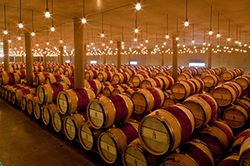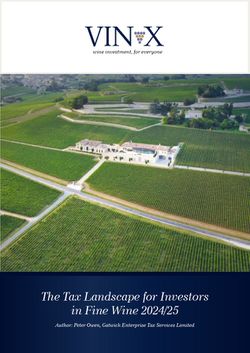HMRC changed the way Alcohol Duty on wine is calculated on the 1st February 2025. What does this mean for consumers and investors?
The change in how wine is taxed in the UK was set in motion by the Conservative Government in August 2023. At that point spirits and other forms of alcohol changed to the new system of linking the level of tax due to alcoholic strength. Given the varying levels in wine the Revenue allowed the wine industry a period to adjust their systems and a single rate applied until the 31st January 2025.
Alcohol Duty Rates from 1 February 2025
Alcohol strength, ABV | Beer | Still Cider | Sparkling Cider | Wine, spirits & other fermented products |
1.3% - 3.4% | £9.61 | £9.61 | £9.61 | £9.61 |
3.5% - 5.5% | £21.78 | £10.02 | £10.02 | £25.67 |
5.6% - 8.4% | £21.78 | £10.02 | £25.67 | £25.67 |
8.5% - 22% | £29.54 | £29.54 | £29.54 | £29.54 |
More than 22% | £32.79 | £32.79 | £32.79 | £32.79 |
Source: H M Revenue & Customs, Alcohol Duty uprating 30.10.2024
How does Alcohol Duty work?
All alcoholic drinks are taxed in the UK and are charged ‘alcohol by volume’ (‘ABV’) on the level of pure alcohol in a product. The Duty reform instigated by the Conservatives was aimed at supporting the public health objectives by incentivising consumption of lower strength products and its impact will be reviewed in August 2026.
Over 80 per cent of the wine sold in the UK is in the alcohol range 11.5% to 14.5% and Duty charged will be calculated by merchants and retailers at ABV multiplied by £29.54 per litre.
How is Duty on Wine calculated?
Firstly – Duty and VAT are only applicable to wine sold once moved out of bonded storage.
Example 1:
A case of 12 x 75cl bottles of Sauvignon Blanc (RRP £180 inclusive of Duty & VAT) with an ABV of 12%:
0.12 x 9 litres (12 x 75cl) = 1.08 litres
1.08 x £29.54 = £31.90 Duty per case
UK Tax percentage of a case of 12% ABV wine at RRP £180 = 17.7% Duty plus 20% VAT = 37%
Example 2:
A case of 12 x 75cl bottles of Chateau Mouton Rothschild 2021(RRP £6,780 inclusive of Duty & VAT) with an ABV of 13%
0.13 x 9 litres (12 x 75cl) = 1.17 litres
1.17 x £29.54 = £34.56 Duty per case
UK Tax percentage of a case of 13% ABV wine at RRP £6,780 = 0.51% Duty plus 20% VAT = 20.51%
Wine consumers will pay more tax with the Duty changes now in place and may only reduce this measure by choosing to reduce their alcohol intake.
How does the change in UK Duty affect Wine Investors?
Nearly all wine investors will acquire their investment fine wine in bonded storage, i.e it is in specialist storage which treats the wine as still ‘offshore’. En Primeur acquisitions remain offshore as the wine is still in barrel in the producers’ cellars.
 VAT and Duty are not triggered until the wine is shipped from bond to external storage such as a retail outlet or private residence. Therefore, wine bought by an investor in-bond, will not trigger a tax charge on purchase.
VAT and Duty are not triggered until the wine is shipped from bond to external storage such as a retail outlet or private residence. Therefore, wine bought by an investor in-bond, will not trigger a tax charge on purchase.
The wine can then be held for years and sold at a higher price to another buyer without triggering a tax payment if the wine remains in bonded storage. Any profit will be exempt from Capital Gains Tax (due to HMRC’s classification of fine wine as a ‘wasting asset’).
This is one of the key differences between investing in wine and equities or property. Investments in shares, bonds, houses and commercial property all require Stamp Duty be paid on purchase and CGT on any gains. The rates for Stamp Duty also rose in the October 2024 Budget.
Capital Gains Tax changes and Fine Wine
Firstly, it's important to remember that fine wine does not attract CGT as HMRC has classified wine as a Wasting Asset. This exemption is even more valuable with the changes to CGT allowances and rates.
The CGT Allowance reduced in April 2024 from £6,000 to £3,000 on the sale of assets before any tax had to be paid. In addition, in Rachel Reeve’s first Budget on the 30th October 2024, the CGT rates payable were increased from 10% to 18% for basic rate tax payers and from 20% to 24% on disposals after that date.
 These changes mean that smaller investors are getting caught up and paying CGT for the first time on profits made on qualifying gains.
These changes mean that smaller investors are getting caught up and paying CGT for the first time on profits made on qualifying gains.
Our special Report on Tax and Fine Wine reveals the tax benefits wine investors can enjoy as an exempt asset.
Our view on Fine Wine and Tax
The answer to the original question is that the changes in Alcohol Duty will not impact UK investors in fine wine.
Clearly, there are tax benefits to be enjoyed by including fine wine in your portfolio planning and we recommend that you discuss this with your professional tax advisor.
For more information see our Guide to Investing in Fine Wine and get the latest insight on current market opportunities by speaking to a member of our expert team on 0203 384 2262.

